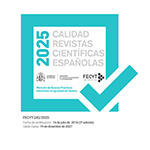La dimensión territorial de la crisis de la vivienda y el despilfarro inmobiliario residencial
Resumen
Tras el último boom inmobiliario y la consiguiente crisis, con efectos económicos sobradamente conocidos, hay que volver a insistir sobre la necesidad de abandonar un modelo de desarrollo urbano gobernado por el negocio inmobiliario y ajeno a criterios de racionalidad, equidad y sostenibilidad en el uso del territorio y en la construcción de espacio residencial. La vivienda, antes que un alojamiento, es un activo económico. Su mercado es la pieza fundamental de ese modelo que ignora su papel estructurante del territorio y su condición de espacio necesario para satisfacer un derecho básico. Se propone una reflexión sobre las raíces del actual modelo y se subrayan sus consecuencias en forma de despilfarro territorial y en el agravamiento de las dificultades para acceder al uso de una vivienda digna y adecuada. Finalmente, se hacen valoraciones a nivel local de los efectos del actual modelo, de las necesidades de vivienda y de las oportunidades de utilización del parque residencial existente.
Descargas
##plugins.generic.pfl.publicationFactsTitle##
##plugins.generic.pfl.reviewerProfiles## N/D
##plugins.generic.pfl.authorStatements##
Indexado: {$indexList}
-
##plugins.generic.pfl.indexedList##
- ##plugins.generic.pfl.academicSociety##
- N/D
- Editora:
- Ediciones Complutense
Descarga artículo
Licencia
La revista Cuadernos de Relaciones Laborales, para fomentar el intercambio global del conocimiento, facilita el acceso sin restricciones a sus contenidos desde el momento de su publicación en la presente edición electrónica, y por eso es una revista de acceso abierto. Los originales publicados en esta revista son propiedad de la Universidad Complutense de Madrid y es obligatorio citar su procedencia en cualquier reproducción total o parcial. Todos los contenidos se distribuyen bajo una licencia de uso y distribución Creative Commons Reconocimiento 4.0 (CC BY 4.0). Esta circunstancia ha de hacerse constar expresamente de esta forma cuando sea necesario. Puede consultar la versión informativa y el texto legal de la licencia.











